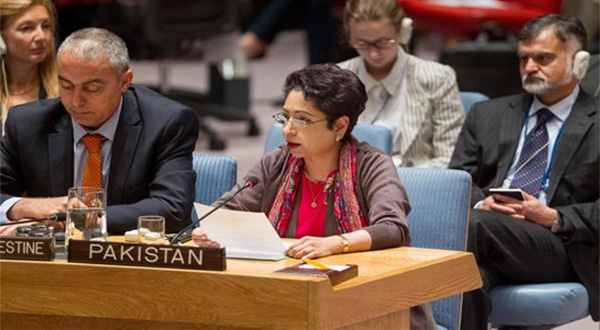At the United Nations, Pakistan welcomed the nuclear deal with Iran hoping this would also help find regional solutions to the Middle East’s growing challenges, says a press release received here today from New York.
Speaking in the 15 member Security Council in a debate on the Middle East, Pakistan’s Ambassador Maleeha Lodhi said, “The landmark agreement reached with Iran, which if fully and sincerely implemented, could not only contribute to nuclear non-proliferation but also regional stability, cooperation and economic growth”.
It could open the way for “closer consultations and even agreement on how to address pressing regional challenges”, she added.
Highlighting the threat posed by ISIS in the Middle East, Ambassador Lodhi called for a comprehensive strategy, military, political, economic and social, to defeat a movement motivated by an ideology of hate and gruesome violence. “ISIS poses a spreading threat to security across the Middle East, North Africa and beyond. A military-only approach is neither sufficient nor permanent in its impact”, she stated.
She emphasized the need to confront and roll back ISIS In Iraq and said that this should be achieved by the state and not sectarian militias. “Success will come only if the minority population is fully assured of its safety and human rights” she asserted. “Durable peace can be achieved through political solutions, not just military engagements”, she added.
On the Syrian crisis, Ambassador Lodhi welcomed the consultations undertaken by the UN’s Special Envoy in Geneva and urged the need for “a serious search for a political solution”.
She voiced Pakistan’s concern that the humanitarian pause had not held in Yemen and urged all parties to the conflict to return to the negotiating table. Ambassador Lodhi called for the restoration of the legitimate government of Yemen but stressed that “this effort should be led by diplomacy and engagement”.
On the Palestine issue, Ambassador Lodhi called on the Security Council to adopt a resolution setting timelines and parameters for establishing an independent, viable and contiguous state of Palestine, based on the pre-1967 borders, with Jerusalem as its capital.
The Pakistani envoy said that Pakistan believes that the path to sustainable peace in the Middle East lies only in the two-state solution and an end to Israeli occupation of all Arab lands. She called upon the 15 member Council to take its responsibilities seriously.
Peace in the Middle East, Ambassador Lodhi said, appeared more distant than ever. Blaming Israel for perpetuation of the crises, she said, “The inflexible and indefensible posture taken by the hardline Israeli government has frozen any prospect for the resumption of the peace process and a political resolution”.
Ambassador Lodhi referred to the Report of the Independent Commission of Inquiry established by the Human Rights Council on the Gaza conflict, which she termed as an an eye opener. “It establishes that “security concerns” cannot relieve Israel of its obligations under international law”, Pakistan’s Permanent Representative said.
Calling for an end to impunity, Ambassador Lodhi said that the persistent lack of implementation of recommendations regarding violations all but guarantee their systematic recurrence.
“Full implementation of the OIC-sponsored and Pakistan-steered Human Rights Council Resolution of July 1, 2015 would be a step towards ending this cycle of impunity”.
She said that Israel’s actions that devastated Gaza were but one aspect of the daily hardships that Palestinians face as a result of Israeli occupation. The eight-year blockade of Gaza, the detention regime, excessive use of force on Palestinian civilians and illegal settlements all continue unabated and unchecked. “It is heartbreaking”, she added, “that of the over 12,500 houses completely destroyed in Gaza, not a single one has so far been rebuilt.”





